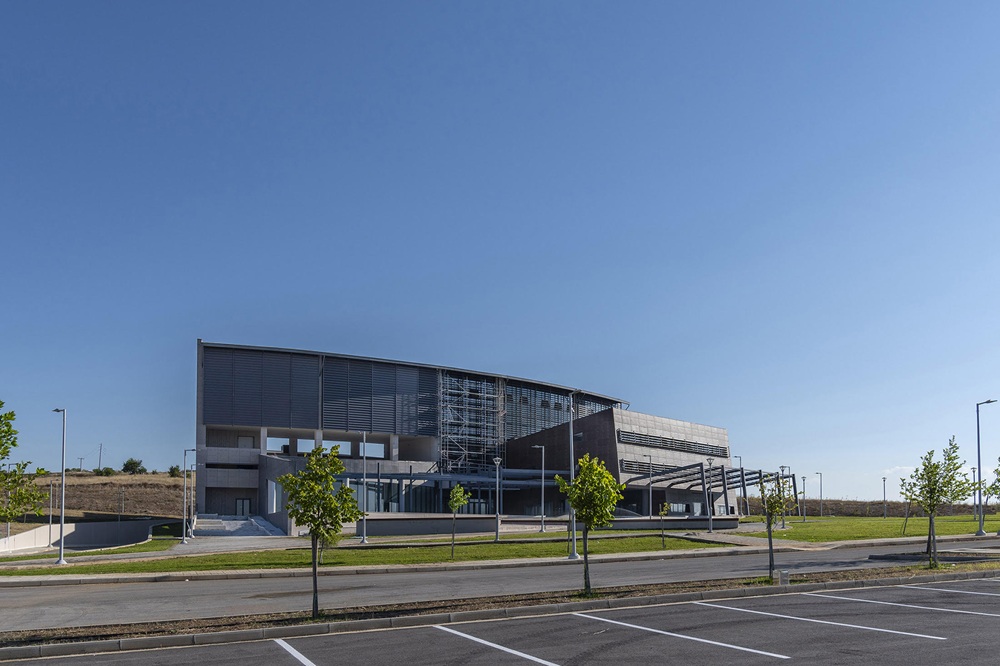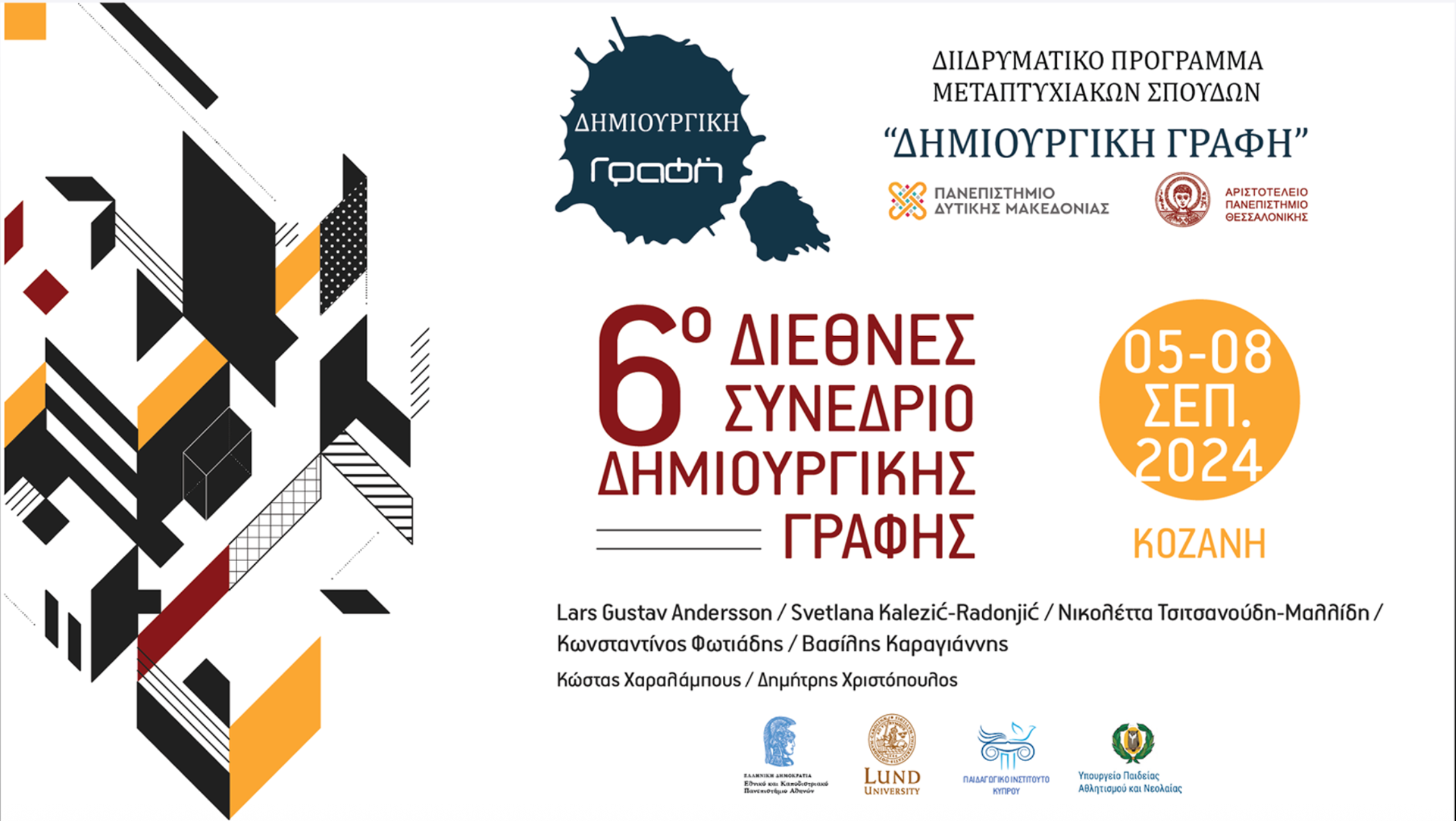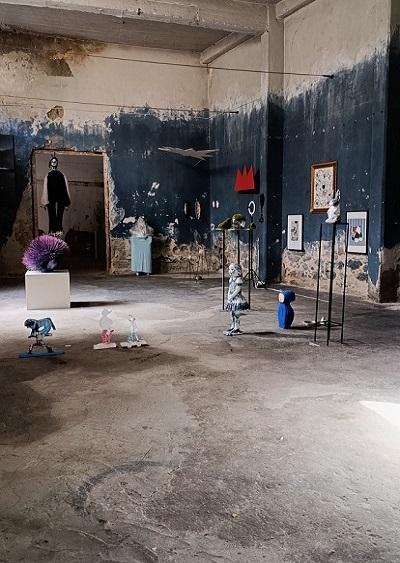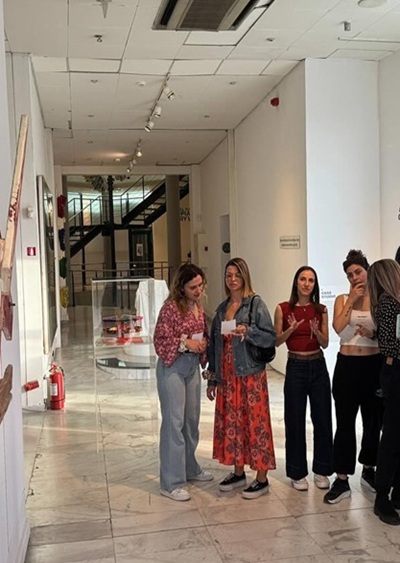
Triantafyllos H. Kotopoulos, Professor of Creative Writing and Modern Greek Literature, is a distinguished figure in the field of academic and creative writing, having taught at many renowned universities abroad (Lomonosov – Moscow – Russia, Palermo – Palermo – Italy, Cyprus University of Technology – Limassol, Frederick – Nicosia – Cyprus) and Greece (Aristotle University of Thessaloniki, National and Kapodistrian University of Athens, Hellenic Open University, Democritus University of Thrace, University of the Peloponnese, University of the Aegean).
As Director of the Master’s Program in Creative Writing and Chair of the Culture Committee at the University of Western Macedonia, he combines scientific rigor with a passion for literature and creativity. He is a member of cultural organizations and international research networks, Scientific Director and President of international Poetry Festivals, but above all he values his participation as a founding member of the Cultural Group of the Panhellenic Association of Paraplegics – Northern Greece Branch. He has organized six international conferences on creative writing.
His writing and research work focuses on the study and teaching of Creative Writing, Modern Greek Literature, and Literary Theory. He has published nine academic books, edited anthologies and books, and has had more than 200 articles published in Greek and international academic journals, anthologies, and conference proceedings. As a writer, he has published seven poetry collections and one collection of short stories, while his lyrics and poetry set to music are available on two CDs. He has organized and presented two television programs on the art of writing (ERT).
In his interview with Days of Art in Greece, Triantafyllos Kotopoulos discusses his educational and literary work, the importance of creative writing, and poetry as a building block of universal culture, since: “Verses are more memorable. The rhythmic structure, the repetition, the musicality help the memory to retain what should not be lost.”
You run the master’s and foreign language undergraduate programs in Creative Writing. What does creative writing mean? Who are these programs for? What are the career opportunities?
Creative writing is a way in which people transform experience into words and feelings into form. It is an art as old as the world itself, but also a contemporary, experiential, pedagogical practice and method that initiates us into the secrets of language, while at the same time helping us to think critically about its composition. You gain a deeper understanding of yourself and the world around you. It is not simply a matter of “writing.” Of course, at the undergraduate and graduate levels, we are not only working on an expressive level, but also on a professional level. Some will become writers, and very good ones at that. Let’s not forget that Kazuo Ishiguro, a graduate of the Creative Writing Master’s Program at East Anglia, was awarded the Nobel Prize. There are countless graduates of similar departments who have received the most prestigious international awards.
The programs I run, both postgraduate and undergraduate foreign language programs, are aimed at people with a real need to express themselves, develop, and create: educators, writers, artists, cultural professionals, but also students from abroad who want to combine literature with contemporary pedagogy or content creation. These are spaces where diverse backgrounds meet and ideas are born. This is perhaps their greatest advantage.
As for professional development, creative writing opens many more doors than one might think. In addition to literary creation, many of our graduates work in teaching, editing, writing educational material, communication, the media, cultural structures, festivals, publishing, and research programs.
Our graduates have received multiple distinctions and awards, including three (3) first-place national literary awards and many others. Above all, however, they constantly enrich our lives.
” The university as an organisation exists within societies, within cities with history, memory, local narratives, traditions, languages, sounds and even silences. When education opens up to culture, a two-way dialogue of knowledge and cultural identity is created.”
You are the Supervisor of New Curricula for Literature in High School. How important do you consider the inclusion of this particular course in the curriculum of public schools for students in their teens? How much can this program help at this age in reading comprehension and in their future entry into the professional arena? What is the relationship between literature and other sciences, such as physics, mathematics, economics, biology, etc.? There is a growing interest internationally in cultivating careful reading. Do you agree with the idea that cultivating this skill through literary texts can lead to better science?
Literature in high school is not a luxury or a decorative element in the timetable. It is a necessary condition for a teenager in a period of tension, identity search, conflict with “who we are” and “who we want to become.” Literary texts help young people process emotions, understand other ways of thinking and behaving, and identify the contradictions of life by comparing experiences and reflecting on the big questions and philosophical queries over time.
The new Curriculum has been designed precisely with this in mind. We want our children to read, be moved, discuss, comment, evaluate, judge, and improve the texts they write. In their professional lives, whatever those may be, the ability to understand complex information, see beyond words, and express their thoughts clearly is invaluable. Literature does not stand in opposition to other sciences. On the contrary, it has been in dialogue with them for centuries. A literary text can shed light on a historical period, engage with economics, explore the ethical weight of biology and medicine, and approach mathematical concepts through narrative structures and techniques. In the New Literature Curriculum for High School and Middle School, for which Professor Kalogirou was responsible, Creative Writing is honored, as is the teaching of extensive and independent literary works (novels, collections of poems and short stories, theatrical texts), and allow us to be proud of this. The model of teaching literature is changing!
We live in an age of speed, information overload, and distracted attention. I believe that a scientist who has trained in literary reading and enjoys literary texts has a better understanding of the complexity of their world. They become more careful in their interpretations, more sensitive to the human dimension of data, and more open to interdisciplinarity.
You have been a visiting professor at important universities abroad (Lomonosov, Palermo, Limassol, Nicosia) and in Greece (Aristotle University of Thessaloniki, National and Kapodistrian University of Athens, Democritus University of Thrace, University of the Aegean, University of Western Macedonia, Hellenic Open University). Do you think that English-language undergraduate programs may be preferred by foreign students as their primary studies?
Yes, I believe that English-language undergraduate programs in Greece can serve as a foundation for students from abroad. The reason is simple: Greece now has a university landscape that combines quality, international orientation, and a particularly attractive cultural environment.
Our recent collaboration with Guiyang University in China and the discovery of thousands of students from countries of the so-called Western world there was further proof that students from other countries are not just looking for a “degree.” They are looking for experience. They want a program that gives them knowledge, international perspectives, and contact with a culture that has depth and continuity. In Greece, this triptych is alive: a high scientific level, a safe academic environment, and daily contact with a language and history that have global appeal. English-language programs can serve as a bridge: bringing young people from different countries into direct contact with Greek literature, education, the humanities, and social sciences, while also strengthening the extroversion of Greek universities. For me, this is not just an academic gain. It is a cultural one. As a country, we have all the tools to attract students who want to study in a warm, humane, safe country with high-quality education. The challenge is to continue investing in these programs, to strengthen them, and to make them a benchmark in the wider region.
“Poetry cultivates empathy, honesty, memory. It tells you: ‘look at the other person’. That alone is a political act.”
You are responsible for international poetry festivals. Why is it important to participate in a poetry festival? How do they differ from other literary gatherings? You are also a poet. Are poets a different group of people? Are they a hope for a more just society? Most of the literary texts that have survived from the past are poetic. Is it verse that helps convey wisdom more easily? Is the nature of all people ultimately poetic?
International poetry festivals are much more than literary gatherings. They are meeting places for people who speak different languages and have different experiences and stories—some pleasant, some traumatic. There, poetry works as a common pulse. I have seen poets from countries that do not speak a common language moved by rhythm, by silence, by intonation. This is their need: to remind us that, before our individual identities, we share a human one. The difference between a poetry festival and other literary gatherings is its immediacy. Poetic speech is not hidden behind plots, characters, or techniques. It is naked, exposed. It requires the listener to stand, listen, accept. There is an almost ritualistic dimension to poetry readings. People gather not to be “informed,” but to be moved, to share, to take something away with them.
I am indeed a poet. Poets, artists in general, do not constitute a “different” group of people. They are often more sensitive, noticing things that others overlook. Can poetry be a hope for a more just society? I wouldn’t say it changes the world directly. But it changes people. And people change the world. Poetry cultivates empathy, honesty, memory. It tells you: “look at the other person.” That alone is a political act.
It is no coincidence that most texts that come to us from the distant past are poetic. Verse is easier to remember. Rhythmic structure, repetition, and musicality help the memory retain what should not be lost. Before writing, humans sang. And that says a lot about our nature. All humans have a poetic nature. Some express it through writing, others through speaking, others through their silence. Poetry is not a profession. It is a way of seeing. And this way exists within all of us. The festival, every festival, does nothing more than give it space to breathe.

“Creative writing is a way in which people transform experience into words and feelings into form.”
You are the chair of the Culture Committee at the University of Western Macedonia. We would like to ask you: is the new field that is emerging in education an opportunity for local culture?
As chair of the Culture Committee at the University of Western Macedonia, I can clearly see that the new landscape in education is not simply a change in programs. It is an opportunity to rethink the relationship between the university and the place that hosts it. For many years in Greece, culture was treated as something “external,” as optional in the educational environment. Today, the trend—and the needs of the times—are pushing us in exactly the opposite direction. The university as an organization lives within societies, within cities with history, memory, local narratives, traditions, languages, sounds, and even silences. When education opens up to culture, a two-way dialogue of knowledge and cultural identity is created.
In Western Macedonia, we have a wealth of resources that often remain in the shadows: folk traditions, music, oral histories, local artistic communities, contemporary voices struggling to be heard. New educational fields, whether they concern creative writing, cultural management, or the relationship between digital and cultural heritage, allow us to make use of this wealth. To turn it into knowledge, research, festivals, actions, courses, practices. We must transform this material of creation, research, and extroversion into the core of a new cultural identity, not only for the region, but for the whole country.
“Language is the first home; literature is the second. Through texts, expatriates are connected not only to history or memory, but also to the way Greece continues to think, feel, and transform itself.”
You have organized numerous literary conferences. However, your personal creation, the biennial international Creative Writing conference, stands out. Six have been held so far in various cities in Greece (Athens, Corfu, Florina, Kozani), as well as in Palermo, Italy. And you are also preparing the seventh one for October 2026 in Larnaca. Tell us about its themes. Who is it aimed at?
The International Creative Writing Conference is a project that began several years ago. and the first one was held in Athens in 2013, because I always believed that Creative Writing in Greece should have an institutional space, be discussed academically, and be linked to education, culture, literature, translation, and new media. Since then, every two years, the conference has been hosted in a different city, like a kind of “traveling school.” Athens, Corfu, Florina, Kozani, Palermo.
Its themes are essentially those defined by the scientific field of Creative Writing. Its role and function in educational and teaching practice, its theoretical and critical approaches, issues of interculturalism, eco-criticism, identity and gender, narrative and literary techniques, synergies with other arts and its coexistence with contemporary digital environments and Artificial Intelligence.
The 7th conference will be held in Larnaca in October 2026 in collaboration with the National and Kapodistrian University of Athens, the Cyprus Pedagogical Institute, and UCLan Cyprus University. It is aimed at academics, researchers, writers, educators, students, and cultural figures interested in the relationship between writing and society. Once again, there will be distinguished guests, as well as many young creators. The establishment of this conference and the contribution of the postgraduate programs of the University of Western Macedonia have played a decisive role in the recognition and establishment of this scientific field in Greece.
To what extent can literature serve as a bridge between Greece and its diaspora?
Literature is one of the strongest ties between the diaspora and Greece. Language is the first home; literature is the second. Through texts, expatriates are connected not only to history or memory, but also to the way Greece continues to think, feel, and transform itself. Literature conveys the living language, the humor, the irony, the anxieties, the dreams. It conveys the homeland. Diaspora communities have a deep need for this connection. And here, actions and efforts such as yours should be rewarded, at least verbally. However, we must also bear in mind another dimension of literature, art, and culture more broadly. They function as a form of cultural diplomacy. The relationship with Greece cannot and should not be just “nostalgia.” It is participation. It is presence.
“Our graduates have received numerous distinctions and awards, including three (3) first-place national literature awards and many others. Above all, however, they constantly enrich our lives with their companionship.”
Can we identify any powerful literary works in Greek literature, from the years of the Revolution to the present day, that could be included in the “Western Canon”? Which writers would you personally single out? Are we primarily a country of poets?
There are creators who could, in fact, be considered “universal.” Kazantzakis, Cavafy, our Nobel laureates Seferis and Elytis, and Ritsos have been widely translated and read internationally. I would be doing many people an injustice if I insisted on a sterile list of names, and I must not. Personally, I consider Nikos Bakolas’s Megali Plateia (The Big Square) and Kostas Mourselas’s Vammena kokkina mallia (Red Dyed Hair) to be masterpieces of our post-war prose. Among female poets, I would single out Anthoula Stathopoulou-Vafopoulou and Katerina Gogou, who preceded those who were later considered very important, Katerina Angelaki-Rouk and Kiki Dimoula. The key to becoming part of a global canon is to be deeply local, but not narrow-minded and conservative.
Tell us a little about your personal literary work. You have written academic books, collections of poems and short stories, and some of your lyrics have already been set to music. You have edited and presented television programs on books, literature, and culture on ERT. What is your personal vision?
I have written and continue to write as both an academic and a poet-creator. Nine (9) scientific monographs, more than two hundred (200) articles in international scientific journals, collective volumes, and conference proceedings. Seven (7) poetry collections, one (1) collection of short stories, two CDs with my poetry set to music or lyrics I wrote to be turned into songs. I have been fortunate to realize many of my dreams. The ERT television programs “Digamma” and “Grafi Kathari” and their high ratings proved that cultural practices can and should be served by the mass media. I am not resting on my laurels. We are moving forward!







Leave A Comment